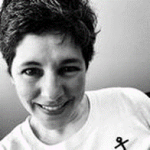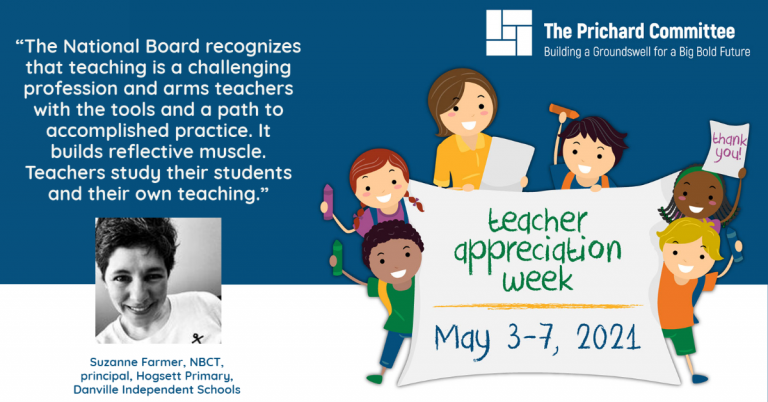The first time I read the National Board’s seminal text, What Teachers Should Know and Be Able to Do, I felt seen, heard and valued. The text was written by teachers and for teachers. It makes it clear that our work as teachers and learners is difficult. Not in the way that parents post on social media that teachers should be paid a million dollars after trying to manage virtual school. Or in the way that makes teachers sound like super-human beings. We don’t have super powers. We work. The National Board made my work more focused and effective.
When I started teaching, there was pressure at my school to have a cute door and bulletin boards. I always hated the amount of time it took to make cheap school paper look welcoming and presentable. When my National Board mentor gave me the advice to question everything I was doing, and prioritize my time on what would have the greatest impact on my students’ learning, I stopped spending my time on a Pinterest-looking classroom. Instead, I asked my students what they thought should be on our bulletin boards and door and let them create their own classroom environment. The result was a door with their self-portraits, student-written welcome messages, and words that explained what was important to our classroom. Our bulletin boards became student-managed public portfolios of their best work. Students were invited to reflect, just as I had, on what was important to our classroom community, and about their own growth as learners. One kindergarten student reflected on her progress at the end of the year about a description of her five family members she’d written earlier in the year of three readers, one who can’t read (her cat), and one who is learning (herself) and said, “I will need to change this! I can read now!”
Board certification is a rigorous process like teaching. It isn’t a one-and-done, learn-from-outside-“experts” process where participants can be passive. Instead, teachers are tasked with an intense study of self and their students. It’s taking an honest look in the mirror. It’s working with your strengths. It’s making continuous long-lasting improvement. In addition to taking an assessment, teachers submit a portfolio with detailed written evidence, student work, and teaching videos. Every portfolio is unique, just like our students. National Board recognizes that excellence can look a myriad of different ways; it doesn’t expect you to become a different teacher, just a better one. By studying your students, you get to know them in terms of their background, home, personality, preferences, dreams, and thinking. Not only does instruction improve with this information, but students are seen, heard, and valued for who they are.
Teaching is hard. It’s full of tension, conflicting objectives, and choices. The National Board recognizes that teaching is a challenging profession and arms teachers with the tools and a path to accomplished practice. It builds reflective muscle. Teachers study their students and their own teaching. When that happens, teachers don’t only become more effective, we become powerful models of curiosity, perseverance, lifelong learning, achievement, and testing hypotheses. Sometimes my students have joined me as partners, determining how to make a lesson better. In those moments, they see me seeking their important feedback and determined to get better.
Kentucky has a strong history of bi-partisan support for Board certification; we value what works. More than a decade of research measures the impact of Board-certified teachers as having 1-2 more months of growth per year with students. Our state provides teachers with a permanent rank change (from rank 3 to 2, or 2 to 1) and a $2,000 stipend each year teachers teach or mentor in their certificate area. The Kentucky National Board Certified Teacher Network offers candidate support and connection for those interested in pursuing Board certification. It’s why Kentucky is one of the nation’s leaders in Board certification. We currently rank 8th in the nation for the number of Board-certified teachers with 4,114.
I’m no longer a classroom teacher, but as a principal I’ve continued to maintain and use the professional skills I’ve acquired through my Board certification. When making school decisions, supporting teachers, or working with parents, I’m often faced with the difficult tensions and choices the National Board honors in its description of teaching. The National Board has helped me keep my solutions student centered. It’s worth the time and effort to invest in my staff by supporting their candidacy; teachers don’t just grow in their practice, but they are more likely to stay because they are empowered. National Board Certified teachers are like my former students reflecting on their progress, and updating the class bulletin board as they make progress, creating a classroom community and establishing a culture for learning.
ABOUT THE AUTHOR

Suzanne Farmer achieved National Board Certification as an Early Childhood Generalist in 2004 while teaching preschool, and renewed her certification while working as a mathematics interventionist. In 2012 Suzanne received the Presidential Award for Excellence in Mathematics and Science Teaching. Suzanne served as the Director of the Kentucky Network to Transform Teaching, the grant project that innovated using the National Board resources for professional learning, from 2014 to 2018. In that role, Suzanne was the liaison with national, state, and local partners including the National Board for Professional Teaching Standards organization. Suzanne is the principal of Hogsett Primary in the Danville Independent Schools, a National Board Professional Learning School. Suzanne currently serves on the Board of Directors for the Kentucky National Board Certified Teacher Network. Follow her on Twitter @SuzanneFarmer


